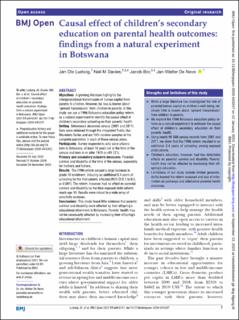Causal effect of children's secondary education on parental health outcomes: findings from a natural experiment in Botswana
Peer reviewed, Journal article
Published version

Åpne
Permanent lenke
https://hdl.handle.net/11250/3018460Utgivelsesdato
2021Metadata
Vis full innførselSamlinger
Sammendrag
Objectives A growing literature highlights the intergenerational transmission of human capital from parents to children. However, far less is known about ‘upward transmission’ from children to parents. In this study, we use a 1996 Botswana education policy reform as a natural experiment to identify the causal effect of children’s secondary schooling on their parents’ health.
Setting Botswana’s decennial census (2001 and 2011). Data were obtained through the Integrated Public Use Microdata Series and are 10% random samples of the complete population in each of these census years.
Participants Survey respondents who were citizens born in Botswana, at least 18 years old at the time of the census and born in or after 1975 (n=89 721).
Primary and secondary outcome measures Parental survival and disability at the time of the census, separately for mothers and fathers.
Results The 1996 reform caused a large increase in grade 10 enrolment, inducing an additional 0.4 years of schooling for the first cohorts affected (95% CI 0.3 to 0.5, p<0.001). The reform, however, had no effect on parental survival and disability by the time exposed child cohorts reach age 30. Results were robust to a wide array of sensitivity analyses.
